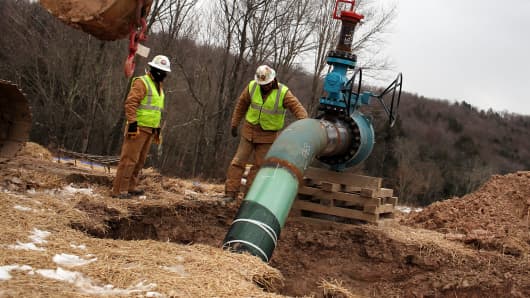The more than $25 billion in energy deals this week suggest there could be a lot more merger activity among companies looking to gain a foot hold in the oil and gas shale boom that is transforming the American energy business.
Kinder Morgan Sunday announced its acquisition of El Paso Corp for $21.1 billion, a deal that would create the largest operator of natural gas pipelines in the U.S. It is also seen as a play on the growth of shale gas production which will need new distribution.
The new company would have 67,000 miles of natural gas pipelines spanning the U.S. and reach every major natural gas production center. It would also take Kinder Morgan into Florida and connect Pennsylvania, Arkansas and Texas.
The second deal was Statoil's $4.4 billion acquisition of Brigham Exploration . Brigham has assets in the Williston Basin in North Dakota and Montana, which includes the Bakken and Three Forks oil formations. Statoil said it expects current equity production of 21,000 barrels oil equivalents per day to potentially ramp up to 60,000 to 100,000 boe per day equity production over five years.
Norwegian state-owned Statoil already has a stake with Chesapeake Energy in the Marcellus shale formation, centered in Pennsylvania. It also owns acreage in the Eagle Ford prospect in Texas with Talisman Energy.
"Marcellus is primarily dry gas, Eagle Ford is a combination of dry gas and liquids and this (Brigham) is oil. We now have a good deep position in the U.S. in unconventionals," said Statoil Chief Executive Helge Lund.
Daniel Yergin, chairman of IHS Cambridge Energy Research Associates, said this type of deal activity is bound to continue, as the growth in shale oil and gas exploration and production was off the radar of many big industry players just several years ago. "These pioneers went into it a few years ago, when nobody was paying attention. It was thought to be a thing for independents, but it's clear it's a big resource play for majors who have the capital these developments require," he said in an interview from Seattle Monday.




